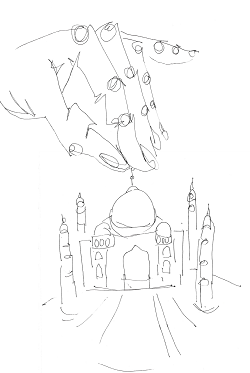 Dust Bunny City
Dust Bunny City
Written by Bud Smith, Illustrated by Rae Buleri
I believe I will always find instances of men baring their emotional vulnerabilities to be beautiful. That is not to say that it is always done effectively or consciously, but it is the beginning of transformation. It is a necessary step in the direction of abolishing misogyny and sexism. It is an act of courage and humility in the face of societal pressure to conform to arrogance. Dust Bunny City is an instance, one that is both effective and conscious, of deeply intimate vulnerability. It embraces romantic love and all of love’s inherent madness, sacrifice, and harmonizing capacity. And it achieves these states through simple self-awareness and a subsequent learned self-acceptance, existing as a touching template for emotional attunement.
Dust Bunny City is a book of poetry, prose, and illustrations that seems to be at home floating in and out of form while consistently capturing the sensations that are its goal. The words, as the book phrases it, come from Bud Smith, and they are the vehicle through which we explore the speaker’s perspective of his marriage. The poems and prose run the emotional gamut, changing from playful and curious to nervous and desperate from section to section, sometimes even within the same poem. They are smart without ostentation, and have beautiful turns of phrase that make even simple language give the reader a depthless cycle for reflection.
you actually do
get a balloon
to flushand that feels important.
beautiful.
like good news.
success on the way.
an obstacle removed.
The love the speaker has for his wife is consistently apparent throughout the work. But you will not find sexist angelicizing or fawning seduction here. The speaker knows he is in love and he embraces it. He reveals the fear he has when his wife is physically distant, the sense of incompleteness in her absence, as well as the fulfillment he experiences when performing the absurd or the mundane alongside her. One of the most touching moments, for me, was in the poem “Wonder of the World”, where the speaker receives something that most of us would dismissively refer to as corny, and yet he takes it in as a token of true affection, something that makes him truly happy.

The above illustration is from that poem, “Wonder of the World”, and it is a beautiful snapshot of the elegant and simple art from Rae Buleri. In the interest of clarity, I admit I am an appreciative but utterly uneducated admirer of visual art. But I find Rae’s works in this book to be the perfect compliment to her husband’s words. They are never obstructive, a problem I’ve encountered before in literary works with visual accompaniment, and while they are attached to certain poems, they float through the text like nebulous reflections of Smith’s words. They provide the reader with an echo, an idea, that can flavor or spawn perspectives from which to view the text. Like the words, they move on their own whims between meandering and playful to sharp and edged, often combining the range of their spectrum into conceptual chimeras that are at once impressive and humble. Probably their strongest attribute is in their ability to reinforce one of the central themes running through the text – the idea that love is deeply personal and conceptually strange, that it requires interaction and cannot be fully fleshed out through description or depiction alone.
If one is going to engage with a text on these levels, then I find the value of re-approachability to be critical. Dust Bunny City excels here because it achieves that exceedingly difficult combination of layered depth and linguistic straightforwardness. It never tries to be ambiguous, and yet it manages to carry you in a satisfying way through ideas that can’t fully be explained. It never dumbs down its delivery or its themes, because it engages you as a peer, as someone to be trusted and confided in. And, quite simply, the book isn’t afraid to be happy. That isn’t to say that it is naïve or blindly optimistic. Dust Bunny City appreciates the beauty in front of it and knows that, without it, life is not complete.
Dust Bunny City is available now through Disorder Press.
